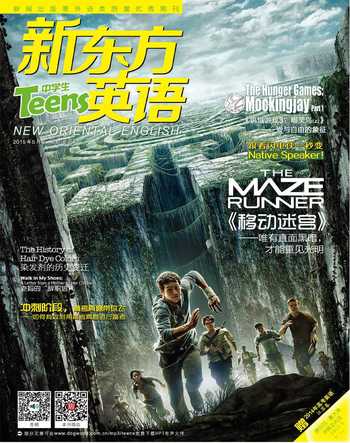反乌托邦末世小说:那么爱你为什么?
两袖清风
反乌托邦末世小说,如果说这个词对你来说有些陌生的话,那么诸如《饥饿游戏》《分歧者》《移动迷宫》这类电影你一定不会觉得陌生。这些电影以世界末日后的社会为背景,影片中的主人公因为种种原因不得不去决斗、反抗、求生,让众多青少年震撼和痴迷。众所周知,这类电影都改编自其同名小说,而这类小说就是近年来颇受青少年欢迎的反乌托邦末世小说。为何这类小说会得到青少年的青睐?为何它们会掀起一股末世小说潮流?且让我们随本文去一探究竟。
Duels3) to the death. Revolution. Post-apocalyptic survival. Is this the stuff of popular young adult literature today? In a word, yes. In the last few years, dystopian novels have dominated the young adult—better known as YA—bestseller lists. One of the most popular series is The Hunger Games. But it's certainly not the only one. Divergent and The Maze Runner, like The Hunger Games, are just a few of the many recently published books that tap into4) YAs' hunger to read about dystopian societies in a post-apocalyptic future. So, what's driving this trend?
生死对决。革命反抗。劫后求生。难道这是如今青少年文学流行的题材?两个字:没错。近几年来,反乌托邦小说一直雄踞各大青少年(俗称YA)小说畅销书排行榜的榜首。其中最受欢迎的系列小说之一便是《饥饿游戏》。不过,《饥饿游戏》当然也绝非唯一的一部。青少年渴望阅读描写有关未来浩劫之后的反乌托邦社会的小说,近来出版的很多书就抓住了他们的这种渴求,而《分歧者》和《移动迷宫》就像《饥饿游戏》一样,不过是沧海一粟罢了。那么,是什么推动了这股风潮?
What's Old Is New Again 旧瓶装新酒
Many experts attribute the trend to the uncertain times young people are growing up in. Many of the new novels are set in a post-apocalyptic future, in which young people must clean up the mess their elders have made.
Todd Mitchell, author of YA novel Backwards and other books, believes that the post-apocalyptic angle seen in so many YA novels today is a response to a deep-rooted social need or anxiety. "We know that all our pollution and over-consumption is driving the planet to ruin. We might not accept the science of climate change, but we can't ignore all the droughts, floods, super storms, forest fires, heat waves and other signs of a world spinning out of balance. Nor can we ignore the many signs of social inequality leading to civil unrest." he wrote on his website.
Mitchell thinks young people are especially sensitive to these issues, which has driven the popularity of books set in a bleak5) future. "I think teens are particularly aware of this, perhaps because they're not so interested in the status quo6)," he said. "Or perhaps because this is the world they're inheriting, and they're [upset] that we're trashing7) it. So there's a thread of anxiety running through our culture."
Indeed, what's different today, says Claudia Gray, New York Times bestselling author, is the amount of pressure on young people. "I think the pressure on young adults to define themselves has increased, and it's starting earlier and earlier in life," said Gray. "We see increased standardized testing, increased homework levels, etc. By the time you're 14, you've already been forced into a mold that's going to be hard to break out of."
很多专家认为,之所以出现这股潮流,是因为当今青少年成长的时代充满了不确定性。许多新出版的小说都将故事背景设定在浩劫过后的未来世界,里面的年轻一代不得不去收拾老一辈留下的烂摊子。
青少年小说《倒带》等书的作者托德·米切尔认为,如今以末日浩劫为切入角度的青少年小说数不胜数,这反映出一种根深蒂固的社会诉求或者说社会焦虑。“我们知道,各类环境污染和过度消耗正使地球走向毁灭,我们或许可以不接受有关气候变化的那套科学理论,但却无法忽视旱灾、洪涝、超强风暴、森林火灾、高温以及其他全球失衡的迹象,也无法忽视诸多社会不公引发民乱的现象。”他在自己的网站上写道。
米切尔认为,年轻人对这些问题尤为敏感,这促使以悲惨未来为背景的小说大行其道。“我觉得青少年更能意识到这些问题,这或许是因为他们对现状不那么感兴趣,”他说,“也或许是因为他们接手的世界就是如此。看到我们这样糟蹋这个世界,他们感到[不安]。因此,我们的文化里贯穿着一种焦虑。”
此言不虚。《纽约时报》畅销书作家克劳迪娅·格雷表示,年轻人面临的压力今非昔比。“我认为青少年面临的安身立命的压力越来越大,而且这种压力在生活中出现得也越来越早,”格雷说,“我们看到越来越多的标准化考试和越来越多的家庭作业等等。等他们长到14岁的时候,他们早已被迫定格成型,再难从中突破。”
Breakout Roles 突破性角色
Gray noted that many dystopian, post-apocalyptic YA novels are specifically about refusing to accept the definitions, tests and choices forced on young characters by their society. "Almost all YA dystopians at least touch on this theme—refusing to let anyone else define you." said Gray.
Today's young people have also grown up amid threats of terrorism, ongoing war and a 24/78) news cycle in which darkness and evil-doers are the stars of the show. The books they are drawn to may reflect the times they are living in.
"For today's young adults, a world of instability, a world that is constantly teetering9) on the edge of another major catastrophe10), is just the norm," said Barna Donovan of Saint Peter's University. "When young adults read these books, stories about teenagers who must fight for their lives and fight for their freedom in a world that a previous generation has wrecked11), they are reading a metaphorical representation of their own world. Today's kids have been handed a world their elders mismanaged, used up, polluted and wrecked. What better metaphor could anyone create for the life of a teenager who knows he or she has no choice but take on a crushing amount of debt to go to college, to gain an education that will make it harder than ever to establish a career, all the while existing in a world of endless foreign wars and watched over by intrusive government bureaucracies12) and corporations that constantly spy on them or monitor all of their electronic communications?"
格雷指出,很多以末世为背景的反乌托邦青少年小说都侧重于表现年轻主人公如何拒绝接受社会强加给他们的定义、考验和选择。“几乎所有的反乌托邦青少年小说都至少会触及这个主题——拒绝让其他任何人界定自己。”格雷说。
如今的年轻人还成长在恐怖主义威胁、持续不断的战争和昼夜不停的新闻报道(负能量、恶势力是报道的重头戏)中。他们爱看什么书或许折射出了他们生活的时代。
“在今天的年轻人看来,世界动荡不安,总是一副浩劫在即、大厦将倾的模样才是正常的,”美国圣彼得大学的巴尔纳·多诺万说,“而这些末世小说讲述的都是这样的故事:青少年生活在一个被上一代破坏的世界里,他们必须为自己的生存和自由而战。当青少年读这些小说时,他们从中仿佛读到了自身所处世界的影子。今天的孩子们从老一辈手里接过的是一个混乱无序、资源枯竭、污染遍布、千疮百孔的世界。他们知道,为进大学他们别无他法只能高筑债台,但接受的教育却会越来越难以让他们撑起一份事业。而且与此同时他们还置身于一个充满无休无止的对外战争的世界,处于无孔不入的政府机关以及企业的监视之中——这些机关和企业不断在监控青少年或其所有电子通信信息。除了反乌托邦末世小说,谁还能创造出可以更好地反映青少年这种生活写照的东西?”
1. apocalyptic [??p?k??l?pt?k] adj. 世界末日的;毁灭性的
2. dystopian: 请参见P15注释1
3. duel [?dju??l] n. 决斗;竞争
4. tap into: 设法(通过可以带来好结果的方式)利用
5. bleak [bli?k] adj. 没有希望的;凄凉的
6. status quo: 现状;原状
7. trash [tr??] vt. 破坏,捣毁
8. 24/7: 一天24小时、一星期7天的缩写,指“全天候(提供服务)的”。
9. teeter [?ti?t?(r)] vi. 面临(险境);濒临(灾难)边缘
10. catastrophe [k??t?str?fi] n. 大灾难;浩劫
Rise of the Technology 科技的崛起
The prevalence13) of technology may also be a factor fueling the popularity of dystopian, post-apocalyptic fiction among young adults. Via smartphones, tablets14) and, increasingly, wearables15), tech is literally at our fingertips all day every day. And tech-savvy16) young people are well aware that being that connected means most of our movement and communication can be tracked. These are all themes that show up in current YA fiction.
Monique Anair, assistant professor of Santa Fe Community College, believes we are at an interesting inflection point: in addition to young adults' natural desire to see themselves in what they read and watch, technology has made it possible to present those images more realistically.
"In almost all dystopian worlds, young people hold the values that the adults have forgotten," she said. "Against all odds in the horrible world that the adults have left them, the children know what is important. They love, survive and struggle to make sense of their own personal power."
科技的普及或许也是促使反乌托邦末世小说在青少年中间十分盛行的一个因素。通过智能手机、平板电脑以及势头渐强的可佩戴式电子设备,科技几乎时时刻刻都触手可及。懂科技的年轻人深知,我们和科技如此紧密的联系意味着我们的大部分活动和通信都可以被追踪。这些全都是如今的青少年小说中展现出的主题。
圣达菲社区学院助理教授莫妮克·安埃尔认为,我们当前处在一个有趣的拐点:除了年轻人自然而然地会想要从所读所见中看到自己的身影,科技业已能够将这些形象更加真实地呈现出来。
“在几乎所有的反乌托邦小说里,年轻人都秉承着大人们早已忘却的价值观念,”她说,“孩子们在大人们留给他们的那个可怕的世界里顶住重重困难,他们知道什么重要。他们爱着,生存着,奋斗着,只为发挥一己之力。”
It's a story as old as time—and as new as Mockingjay.
他们的故事如岁月般古老,亦如《嘲笑鸟》般新鲜。
11. wreck [rek] vt. 弄坏;毁坏
12. bureaucracy [bj???r?kr?si] n. 官僚(集称);官僚制度
13. prevalence [?prev?l?ns] n. 流行;盛行
14. tablet [?t?bl?t] n. (= tablet computer)平板电脑
15. wearable [?we?r?bl] n. 佩戴式电子设备
16. savvy [?s?vi] adj. 具有实际知识的;知识渊博的
——被大自然接管的精神病院

